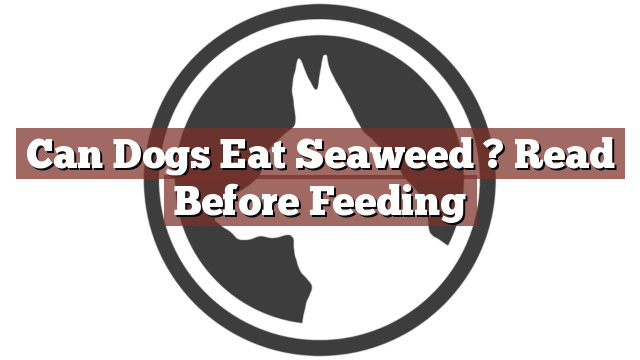Understanding Your Dog’s Dietary Needs
As a responsible pet owner, it is crucial to have a good understanding of your dog’s dietary needs. Dogs have specific nutritional requirements that differ from humans, and a well-balanced diet plays a vital role in their overall health and well-being. While it may be tempting to share certain foods with your furry friend, it is essential to be cautious and ensure that what you offer is safe and healthy for them to consume.
Can Dogs Eat Seaweed? Read Before Feeding
Can dogs eat seaweed? This is a common question among dog owners who are curious about expanding their pet’s diet. The answer is yes, dogs can indeed eat certain types of seaweed. However, it is crucial to exercise caution and moderation when introducing seaweed into your dog’s diet. Not all types of seaweed are safe for dogs, and some can even be harmful. Therefore, it is essential to understand the potential benefits and risks before feeding your dog seaweed.
Pros and Cons of Feeding Seaweed to Dogs
Pros:
-
Nutritional Value: Certain types of seaweed, such as nori or kelp, are rich in vitamins, minerals, and antioxidants. These nutrients can offer various health benefits to your dog, including improved digestion, a stronger immune system, and healthier skin and coat.
-
Dental Health: Chewing on seaweed can help remove plaque and tartar from your dog’s teeth, promoting better oral hygiene and reducing the risk of dental issues such as gum disease.
Cons:
-
Iodine Content: Seaweed can be high in iodine, which is an essential nutrient for dogs but only in small amounts. Excessive iodine intake can lead to thyroid problems in dogs, causing symptoms such as weight gain or loss, lethargy, and skin issues.
-
Contamination: Seaweed sourced from polluted waters may contain toxins or heavy metals, which can be harmful to dogs when consumed in large quantities. It is crucial to ensure that the seaweed you offer to your dog is safe and free from contaminants.
Conclusion: Considerations When Feeding Seaweed to Your Dog
If you are considering adding seaweed to your dog’s diet, it is important to consult with your veterinarian first. They can provide guidance on the appropriate amount and type of seaweed suitable for your dog’s specific needs. When introducing seaweed, start with small portions and monitor your dog for any adverse reactions. If your dog shows signs of discomfort or illness after consuming seaweed, discontinue feeding it immediately and seek veterinary advice.
Remember, while seaweed can offer certain health benefits to dogs, it should never replace a balanced and complete diet. It should be regarded as an occasional treat or a supplement to their regular meals. By understanding your dog’s dietary needs and making informed choices, you can ensure their overall well-being and provide them with the best possible care.
Thank you for taking the time to read through our exploration of [page_title]. As every dog lover knows, our furry friends have unique dietary needs and responses, often varying from one canine to another. This is why it's paramount to approach any changes in their diet with caution and knowledge.
Before introducing any new treats or making alterations to your dog's diet based on our insights, it's crucial to consult with a veterinarian about [page_title]. Their expertise ensures that the choices you make are well-suited to your particular pet's health and well-being.
Even seemingly harmless foods can sometimes lead to allergic reactions or digestive issues, which is why monitoring your dog after introducing any new food item is essential.
The content provided here on [page_title] is crafted with care, thorough research, and a genuine love for dogs. Nevertheless, it serves as a general guideline and should not be considered a substitute for professional veterinary advice.
Always prioritize the expert insights of your veterinarian, and remember that the health and happiness of your furry companion come first.
May your journey with your pet continue to be filled with joy, love, and safe culinary adventures. Happy reading, and even happier snacking for your canine friend!

